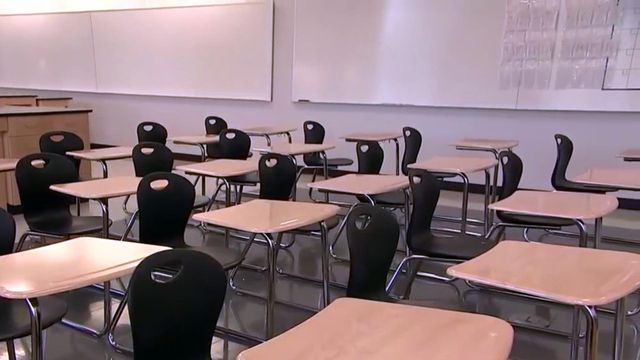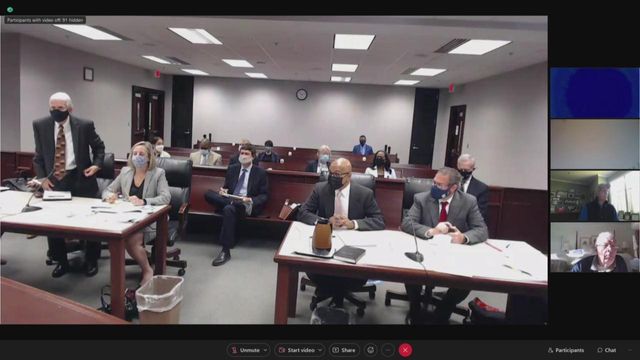Judge asks low-wealth districts for ideas to force lawmakers' hands in NC school funding overhaul
A judge on Monday asked attorneys for five low-wealth school districts to submit a proposed order on how he should force state lawmakers comply with a plan to increase funding for North Carolina's public schools.
Posted — UpdatedHanging in the balance is an overhaul to how the state funds schools – placing less burden on counties, lifting limits on spending for certain higher-needs students, expanding spending on economically disadvantaged students, increasing school support staff and supporting more ways of securing a diverse and highly-quality educator workforce.
The North Carolina Supreme Court ordered the state in 2004 to comply with its finding in the long-running Leandro case that the state was inadequately funding schools, but no spending overhaul plan was approved until June. Since he approved the plan, Superior Court Judge W. David Lee has been anxious to see it implemented.
“I think everyone knows I’m ready to pull out of the station and see what’s at the next bend,” Lee told attorneys at a hearing Monday.
Republican legislative leaders have proposed significantly less than the more than $1.5 billion that would be required in the state budget now being negotiated. They argue they control the state’s budget and are not beholden to court rulings concerning what they spend. Legal experts have pushed back, citing desegregation lawsuits as an example, contending that lawmakers must follow court orders.
So, Lee asked attorneys for the plaintiffs to submit their suggestion of an order he could issue that would force the General Assembly to implement the plan.
Plaintiff attorneys have until Nov. 1 to submit their proposed order, and the state would then have a week to respond. Lee said he would schedule a court hearing Nov. 8 to consider the proposed order.
Melanie Dubis, an attorney for the school boards, argued Monday that Lee has the authority to issue a writ of mandamus – a court order issued to a governmental body – that would order the General Assembly to remedy the shortcomings found in court.
“The duty of this court and the Supreme Court is to vigorously attend to the children from their abridgment and infringement of this right” to an education, Dubis said. If anyone argues the court doesn’t have that authority, she said, they are “arguing this state constitution is not worth the paper it’s written on.”
Lee said he thought a writ of mandamus might be the proper way to go.
The court-approved compliance plan would cost more than $5.6 billion over the next eight years. That’s an average of about $700 million each year, with costs growing in later years.
The cost will be higher than that figure because of “competitive” salary increases that have yet to be studied and factored into the plan’s costs. Some of the plan’s costs would be temporary, but most would be permanent.
The North Carolina General Assembly spends more than $10 billion on schools annually.
On Monday, Republican leadership took issue with Lee’s assertion that the General Assembly has been a party in the lawsuit because it is “the state.” Lee had said the General Assembly has itself argued in recent years that when “the state” is sued, that includes the General Assembly.
“Judge Lee also appears to have suggested that the legislature has always been a party to this case,” states a news release from Senate President Pro Tem Phil Berger's office. “That is clearly not true, as the out-of-state consultants excluded the legislature from their closed-door process in developing their multibillion-dollar spending proposal.”
Republicans take issue with the plan, unconvinced that more money will, in all cases, yield better student outcomes. They instead promote their well-underway overhaul of reading instruction in the state and attempts to increase funding for private school tuition vouchers.
Dubis and attorney David Hinojosa cited prior court cases and existing law that they think allows Lee to order lawmakers to comply with the plan.
In a Kansas City-based education discrimination case that made it to the U.S. Supreme Court, Dubis said, justices ruled that a federal district court could order the school district to levy a tax, though it could not itself levy the tax.
Because the Leandro lawsuit in North Carolina concerns the state constitution, its highest level of appeal is the North Carolina Supreme Court.
Hinojosa also noted cases in other states where judges pushed lawmakers toward compliance and even order specific spending.
In Washington, courts fined the state $100,000 for each day a plan wasn’t implemented to fix spending issues.
In Kansas, in 2004, courts ordered the state’s schools closed until lawmakers complied with an order to remedy education funding.
Lee asked several questions about how quickly lawmakers acted, including in Kansas, where he assumed action might have been taken within a couple of days.
Dubis said the plaintiffs wouldn’t support school closure, because many children would not eat if they could not attend school.
“I wouldn’t want to cause them pain in addition to what they’ve already suffered,” Lee responded.
"This is yet another example of why the founders were right to divide power among the branches of government, giving power to create law and spend money with the legislature, not an unaccountable and unelected trial judge," Berger, R-Rockingham, said in his release. "Judge Lee makes a mockery of our constitutional order with every additional hearing."
Related Topics
• Credits
Copyright 2024 by Capitol Broadcasting Company. All rights reserved. This material may not be published, broadcast, rewritten or redistributed.






